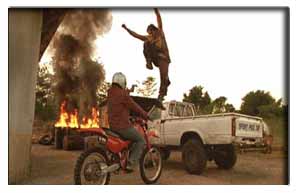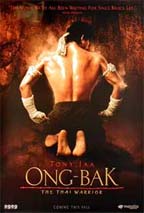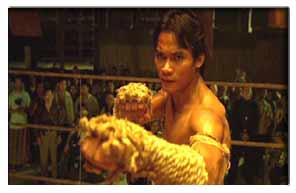|
Ong-Bak:
The Thai Warrior
Wow.
Prachya
Pinkaew’s debut feature Ong-Bak is by no
means brilliant, but damn if it isn’t entertaining
throughout. Pinkaew’s film hits all of the requisite
touchstones one expects from the action martial arts genre
yet somehow manages to work despite the usual trappings.
How you ask?
Two
words: Tony Jaa.
Yes,
the claims being touted that Jaa is the biggest thing to
hit the martial arts scene since the sliced bread that was
Bruce Lee are grandiose, but rest assured, he will amaze
you.
The
typical formula for action films such as Ong-Bak
usually consists of a paper-thin plot that is constructed
solely for the self-serving purpose of acting as a showcase
for down and dirty action stunt sequences. Ong-Bak
is certainly no different, but it does hold a few pleasant
surprises that cause the film to rise above and beyond the
rest of the crop on occasion.
For
instance, when a Bangkok street thug named Don visits the
peaceful religious village of Nong Pradu to persuade one
of the locals to part with an antique religious artifact,
we get a clear look at just how steadfast the locals are
in their beliefs. There is no “right price”
for such an artifact, which the local explains is intended
to be handed down to his son once he is ordained.
This,
of course, provokes Don, so he steals the head of the Buddhist
statue of Ong-Bak, representing their local deity. Such
thievery just happens to coincide with Boonting’s
(Tony Jaa), Ting for short, completion of his Muay Thai
training.
His
trainer insists that he never use the fighting art form,
and it is explained that he killed a man in his very first
“ring match,” an act which prompted him to become
an ordained monk. Everyone knows the drill, fight for good,
and better yet, don’t fight at all. It almost bores
along too far in Ong-Bak, except for those few
saving graces mentioned earlier.
They
come in small doses, but it’s enough to keep things
fresh. First off, there is a scene depicting Ting’s
departure from Nong Pradu. Don had moronically left his
Bangkok address in case anyone had any second thoughts about
parting with any valued artifacts, so naturally someone
must be sent to retrieve the head of Ong-Bak. The village
elects Ting and wishes him luck on his journey by giving
what they can to aid in his quest. Their gifts are small
yet sincere, a few coins here, a bill or two there, a ring
passed down after the death of a loved one. To say that
Nong Pradu is poor is an understatement, yet they give despite
their own personal woes. It’s touching in a genuine
sort of way, and the scene just narrowly evades the schmaltz
factor it could have easily relished in.
At its
core, Ong-Bak is a redemption tale, and again this
is common amongst films of this ilk. The interesting spin
on this particular redemption tale is that Ting is not the
character in need of salvation. Before leaving Nong Pradu,
Ting was asked to deliver a letter to a wayward son in Bangkok
by the same local whom Don had badgered earlier. The man’s
son is Hum Lae (Petchthai Wongkamlao), who left Nong Pradu
to avoid life as a monk and instead became a grifter on
the streets of the big city. Hum Lae now goes by George
in order to fit in and leave his “hick” roots
behind him. He runs scams with Muay Lek (Pumwaree Yodkamol),
a schoolgirl who hustles to pay tuition.
Ting
meets George who wants nothing to do with the quest until
he realizes that Ting possesses a bag full of money. Usually
there would be a scene involving the hero becoming forced
to participate in fights against his will, or for the greater
good of some other hapless victim. That scene comes in time,
but the reveal of Ting’s abilities is far less forced,
yet another one of those subtle touches mentioned earlier.
After learning that George has stolen his money, Ting follows
him to a local fight club and confronts him. George points
to the betting booth when asked about the money, and Ting’s
naiveté leads him into the middle of the ring, a
gesture that indicates a challenge. Ting disposes of his
opponent, the current reigning champion, in one single blow.
This not only serves as a means of exposing his talents,
it also costs the local crime boss Kum Tuan (Sukhaaw Phongwilai)
a large sum of money in the process.
 |
As the
plot unwinds, we learn that Don is actually working for
Kum Tuan, who is gathering up priceless religious artifacts
in plans of smuggling them for an undisclosed reason. One
would assume profit, but the plan is not clearly laid out
and this turns out to be another plus. We know he’s
bad, that will suffice. Kun Tuan wants Ting to fight for
money, and Ong Bak is the key to making him do so. Anyone
can see where this is headed, and it works out well enough
even if it takes a bit of time to get where it’s going.
There
are a few subplots so poorly developed that they need not
be mentioned. Yet despite these trouble spots, the key reason
anyone should even bother to see this film in the first
place is to bear witness to Tony Jaa’s expert displays
of Muay Thai form and prowess. Attempting to describe these
sequences would do injustice to them, so there is little
point in going there at all. The low-budget aesthetic only
adds to the realistic feel of the rather unreal spectacle
on screen. The grainy stock used by necessity, not choice,
makes it feel like you may be watching something on par
with a martial arts snuff film, even though it never really
delves to such dark levels in content.
When
you witness Jaa’s escape from a local street gang
through a small market in Bangkok, you will be hard pressed
to sit still in your seat. Each feat is replayed from different
angles, not just for effect or to make it look cool, but
to add perspective to what Jaa is actually accomplishing
on screen. These sequences are seamless, and well worth
the cost of admission for fans aching for a fix.
Rating:

|








